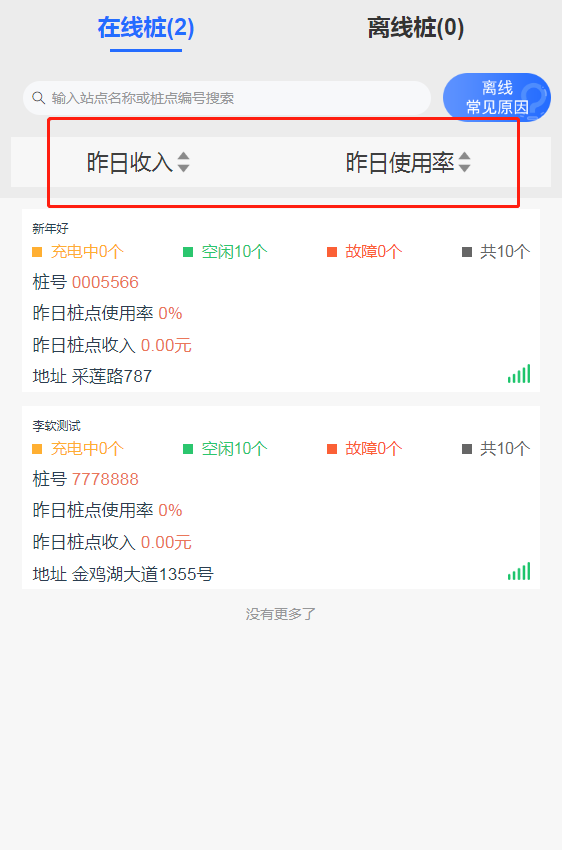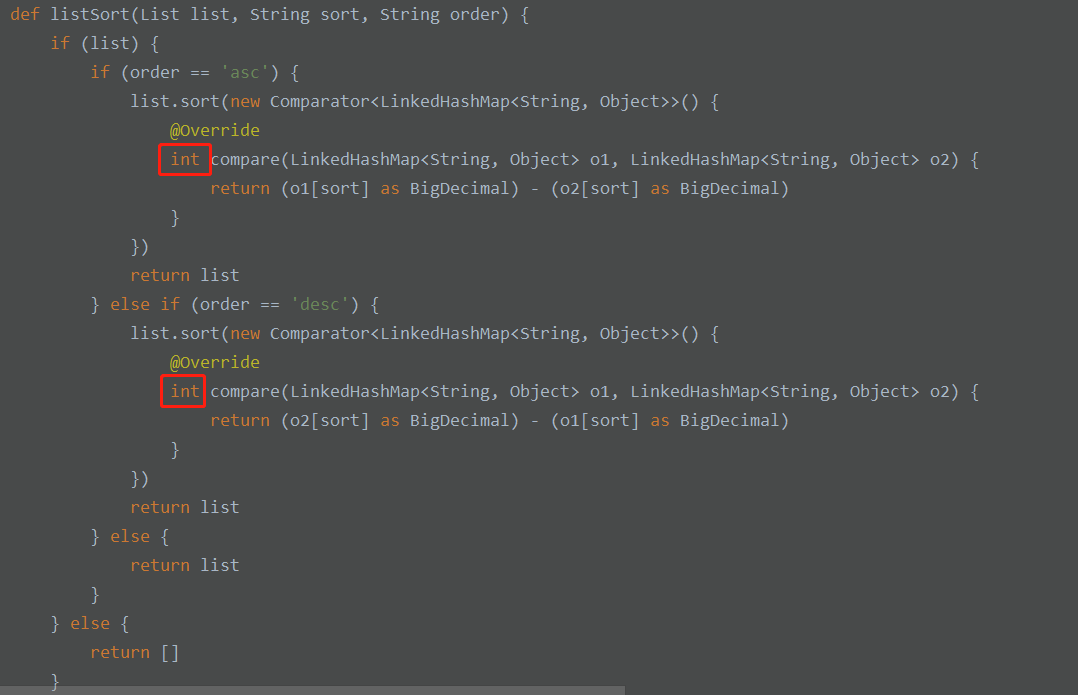想要H5页面中实现升序,降序的排序功能 :

问题 :
点击排序按钮只可以降序,不能升序
原因 :
小于0时无法排序, 原因是返回值为 int 类型, 小于0的值变为0,所以无法排序

但是在解决这个问题同时发现了另外一个问题, 因为要做分页处理(每页数据为15条), 数据超过15条数据时, 那么排序只会排当前页查到的数据, 前面页码数据不参与排序
所以需要在数据库中排序 而不能在 代码中排序(在代码中排序需要将所有数据全部查询出来, 数据过大时会对数据产生影响,不建议使用)
代码 :
1 @Secured('permitAll') 2 def piles(Integer page, Integer size, String searchTerm, String sort, String order, Boolean online) { 3 page = page ?: 0 4 size = size ?: 15 5 sort = sort ?: 'income' 6 order = order ?: 'desc' 7 def user = securityService.currUser 8 def piles = ChargePile.createCriteria().list { 9 eq 'deleted', false 10 if (online) { 11 eq 'status', ModelConst.CHARGE_PILE__STATUS__ONLINE 12 } else { 13 eq 'status', ModelConst.CHARGE_PILE__STATUS__OFFLINE 14 } 15 chargeSite { 16 eq 'platform', PlatformHolder.loadPlatform() 17 eq 'status', ModelConst.CHARGE_SITE__STATUS__APPROVED 18 agent { 19 eq 'user', user 20 } 21 } 22 if (searchTerm) { 23 searchTerm = '%' + searchTerm + '%' 24 or { 25 ilike 'pileNo', searchTerm 26 chargeSite { 27 ilike 'name', searchTerm 28 } 29 } 30 } 31 projections { 32 property 'id' 33 property 'pileNo' 34 property 'location' 35 property 'portCount' 36 chargeSite { 37 property 'name' 38 property 'address' 39 property 'addressDetail' 40 } 41 property 'status' 42 property 'type' 43 } 44 maxResults size 45 firstResult page * size 46 }.collect { Object[] it -> 47 def pileId = it[0] 48 def pile = ChargePile.load(pileId as Long) 49 def pileReport = PileReport.createCriteria().get { 50 eq 'type', ModelConst.REPORT__TYPE__DATE 51 eq 'time', TimeUtils.getYesterdayyyyyMMdd() 52 eq 'chargePile', pile 53 } as PileReport 54 [ 55 id : pileId, 56 pileNo : it[1], 57 total : it[3], 58 siteName: it[4], 59 address : AddressUtils.getFullAddress(it[5] as District, it[6] as String).concat(it[2] as String), 60 status : it[7], 61 busy : it[7] == ModelConst.CHARGE_PILE__STATUS__ONLINE ? pileCacheService.busyPortCount(it[0] as long, it[3] as int) : 0, 62 broken : it[7] == ModelConst.CHARGE_PILE__STATUS__ONLINE ? pileCacheService.brokenPortCount(it[0] as long, it[3] as int) : 0, 63 avaliable : it[7] == ModelConst.CHARGE_PILE__STATUS__ONLINE ? pileCacheService.avaliablePortCount(it[0] as long, it[3] as int) : 0, 64 usedRate: pileReport ? String.format('%.2f', pileReport?.useRate * 100) : '0', // 排序字段 65 income : pileReport ? String.format('%.2f', pileReport?.pileIncomeAmount / 100) : '0.00', // 排序字段 66 ] 67 } as List 68 def result = [ 69 piles: listSort(piles, sort, order), // 上述图片中方法 70 online: countPiles(ModelConst.CHARGE_PILE__STATUS__ONLINE), 71 offline: countPiles(ModelConst.CHARGE_PILE__STATUS__OFFLINE) 72 ] 73 render result as JSON
通过 Bean Searcher 在数据库中进行排序 代码如下 :
1 @SearchBean(tables = '''charge_pile p // sql语句 2 left join pile_report r on r.charge_pile_id = p.id and r.type = 1 and r.time = :time // on后面是对局部条件做限制 3 left join charge_site s on p.charge_site_id = s.id 4 left join agent a on s.agent_id = a.id ''', 5 joinCond = '''p.deleted = 0 and a.user_id = :userId and s.platform_id = :platformId and // joinCond 相当于在sql中的where, where后面是对全局做限制 6 (s.name like :search or p.pile_no like :search)''') // 实现条件搜索(设备名称或设备编号) 7 class PileReportBean implements BeanAware { 8 9 @DbField('p.id') 10 Long id 11 12 @DbField('p.pile_no') 13 String pileNo 14 15 @DbField('p.location') 16 String location 17 18 @DbField('p.port_count') 19 Integer portCount 20 21 @DbField('p.status') 22 int status 23 24 @DbField('p.type') 25 int type 26 27 @DbField('s.name') 28 String name 29 30 @DbField('s.address_detail') 31 String address 32 33 @DbField('r.use_rate') 34 BigDecimal useRate 35 36 @DbField('r.pile_income_amount') 37 Integer pileIncomeAmount 38 39 40 @Override 41 void afterAssembly() { 42 43 } 44 45 }
控制层代码 :
1 @Secured('permitAll') //权限 所有人可以访问 2 def piles(Integer page, Integer size, String searchTerm, String sort, String orderMode, Boolean online) { 3 page = page ?: 0 4 size = size ?: 15 5 sort = sort ?: 'pileIncomeAmount' 6 orderMode = orderMode ?: 'desc' 7 def user = securityService.currUser 8 log.info("user:${user},") 9 def status = online ? 1 : 2 10 def params = [ // sql的 wehre 条件 11 platformId : PlatformHolder.loadPlatform().id, 12 time : TimeUtils.getYesterdayyyyyMMdd(), 13 userId : user.id, 14 status : status, 15 search : '%' +searchTerm + '%', // 搜索条件(通过前端传入) 16 sort : sort, // 排序字段(前端传入) 17 order : orderMode, // 排序方式(desc or asc) 18 max : size, 19 offset : page 20 ] 21 22 def piles = searcher.search(PileReportBean, params) 23 piles = piles.dataList?.collect { it -> 24 [ 25 id : it.id, 26 pileNo : it.pileNo, 27 total : it?.portCount, 28 siteName : it.name, 29 address : it.address, 30 status : it.status, 31 busy : it.status == ModelConst.CHARGE_PILE__STATUS__ONLINE ? pileCacheService.busyPortCount(it.id, it.portCount) : 0, 32 broken : it.status == ModelConst.CHARGE_PILE__STATUS__ONLINE ? pileCacheService.brokenPortCount(it.id, it.portCount) : 0, 33 avaliable : it.status == ModelConst.CHARGE_PILE__STATUS__ONLINE ? pileCacheService.avaliablePortCount(it.id, it.portCount) : 0, 34 useRate : it.useRate ? String.format('%.2f', it?.useRate * 100) : '0', 35 pileIncomeAmount: it.pileIncomeAmount ? String.format('%.2f', it?.pileIncomeAmount / 100) : '0.00' 36 ] 37 } 38 def result = [ 39 piles: piles, 40 online: countPiles(ModelConst.CHARGE_PILE__STATUS__ONLINE), 41 offline: countPiles(ModelConst.CHARGE_PILE__STATUS__OFFLINE) 42 ] 43 render result as JSON 44 }
以上 方法解决 本次所遇到的 排序问题